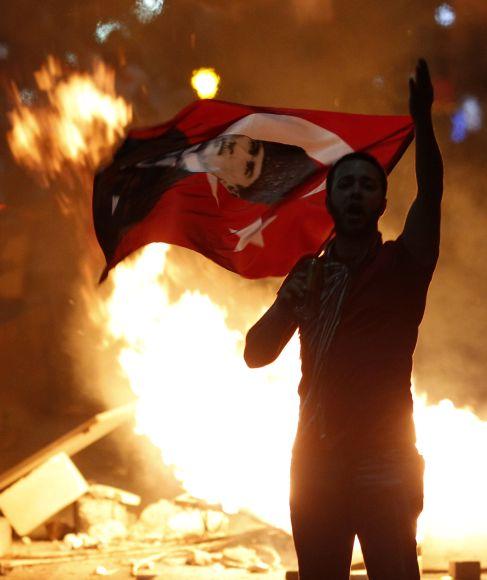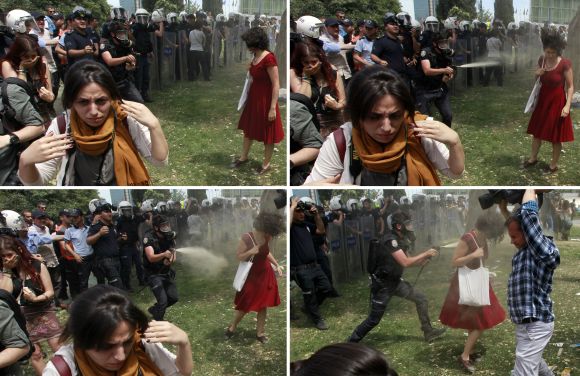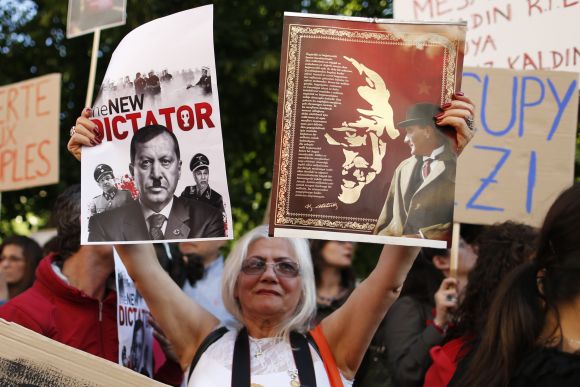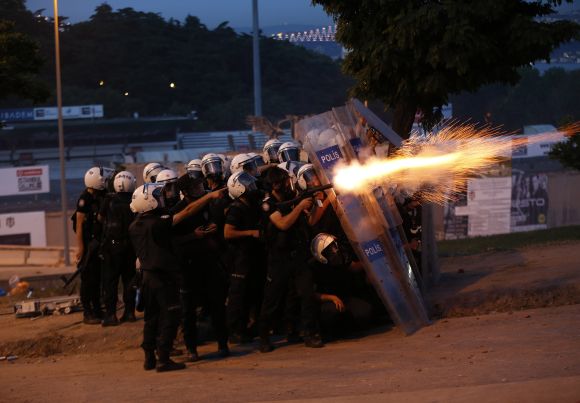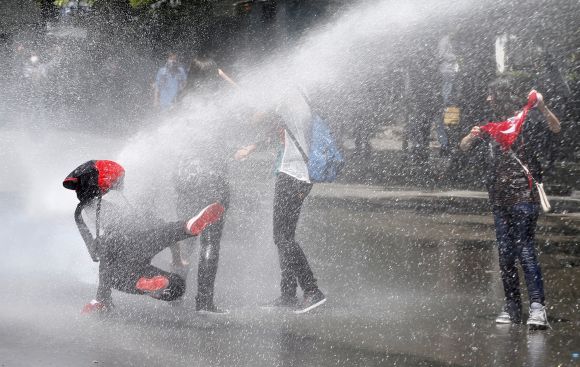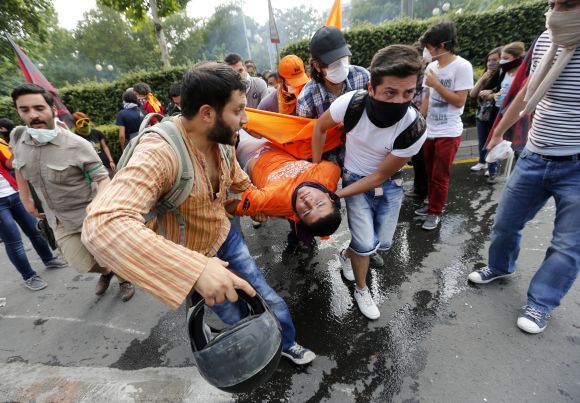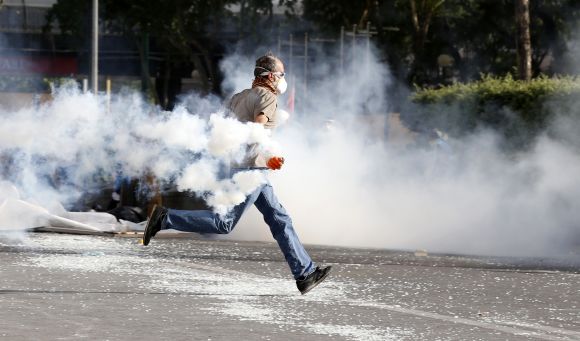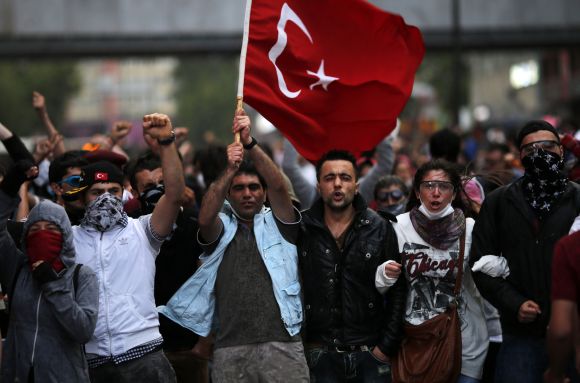 | « Back to article | Print this article |
What is the crisis in Turkey all about?
A protest that erupted in Istanbul last week has snowballed into widespread anger against the Turkey government's increasingly conservative and authoritarian agenda.
So, what caused the situation to take a turn for the worse? Why have the people of Turkey turned against the government? We answer a few of these questions.What triggered the anti-government protest in Turkey?
A peaceful sit-in by hundreds of people trying to prevent trees from being uprooted at an Istanbul park was disrupted by the Turkish riot police that used tear gas and water cannon in a dawn raid.
The raid sparked off angry protests that led to a clash between the police and protestors, injuring several people.
The protest soon spread to Ankara, the capital of Turkey, where agitators chanted anti-government slogans. An Istanbul court later ordered the temporary suspension of the project.
The police were back in action against protestors demonstrating against a government plan to revamp Istanbul's main square, Taksim. The police fired tear gas canisters and pushed back demonstrators with water cannon. The protesters were demanding the square's Gezi Park be protected from plans that include the construction of a shopping mall.
Taksim has been at the heart of a wave of more than 90 demonstrations in 48 cities nationwide.
Click NEXT to read further...
Why are people angry with Prime Minister Recep Tayyip Erdogan?
The clashes that broke out led to demonstrators airing grievances against Turkey Prime Minister Recep Tayyip Erdogan. They criticised his Islamic-rooted government and his increasingly authoritarian tendencies.
A caricature depicting Erdogan as an Ottoman sultan with a caption that read: "The people won't yield to you," was held up by protesters in Gezi Park.
After two days of violent protests the police withdrew. However, thousands of demonstrators flooded the square, shouting taunts at Erdogan, including "We are here Tayyip, where are you?", "Government resign" or "Dictator resign".
What has PM Erdogan's response been?
Erdogan dismissed the protesters' demands, saying the government would go ahead with the renovation plans "no matter what they do."
Facing the biggest anti-government demonstrations since the Islamist-rooted leadership took power in 2002, Prime Minister Recep Tayyip Erdogan after two days called for an immediate end to the violent protests that had engulfed Istanbul.
The police was pulled back from Taksim square, where clashes had injured several demonstrators.
The PM admitted that "there have been some mistakes, extremism in police response," but remained defiant. He vowed to push forward with plans to redevelop the iconic Taksim square -- the very reason that triggered the protests.
"They call me a dictator," Erdogan said in a speech. "If they liken a humble servant to a dictator, then I am at a loss for words."
Erdogan had earlier denounced demonstrators as "vandals".
Erdogan also lashed out at the social messaging service Twitter.
"There is a troublemaker called Twitter, the worst of lies are in there," he told the Haberturk television channel on Sunday, citing false tweets about attacks against protesters and fatalities.
"What they call social media is the nuisance of societies. Society gets terrorised this way."
Click NEXT to read further...
Why are people criticising the Turkish government?
The aggressive crackdown on protests in Turkey has often been harshly criticised. The Istanbul dawn raid was the latest in a series of strong suppression by the government.
The use of undue force by the Turkish police to break up protests and the excessive use of tear gas and pepper spray against protesters has often been brought up by human rights activists.
While the Interior Minister Muammer Guler defended the crackdown, he said the authorities would investigate reports of disproportionate use of force by police at Taksim.
The clash at the Istanbul park had snowballed into widespread anger against the government's increasingly conservative and authoritarian agenda.
The unrest has spread to other cities, with police blocking a group of demonstrators from marching to parliament and the prime minister's office in Ankara.
Amnesty International said some protesters had been left blinded by the huge quantities of tear gas and pepper spray used by police.
Click NEXT to read further...
What has the government's response been?
The Turkey's government on Tuesday apologised to protesters hurt in clashes with police.
"Responsible citizens will stop today," Deputy Prime Minister Bulent Arinc told a televised news conference in Ankara.
"We expect all unions, political parties and everyone who loves and cares about Turkey to do this today."
"The government has learnt its lessons from what happened," he added.
Turkish President Abdullah Gul said the protests had reached a "worrisome level". He called on authorities and the demonstrators to act with restraint.
Interior Minister Muammer Guler said more than 1,700 people had been arrested in the unrest that had spread to 67 cities nationwide, though most have since been released.
"The continuation of these protests... will bring no benefits but will harm the reputation of our country which is admired both in the region and the world," Foreign Minister Ahmet Davutoglu said on Twitter.
The government toll of those injured in the clashes on Tuesday was 64 civilians and 244 police officers. Doctors and rights groups have, however, put the figure much higher.
Click NEXT to read further...
What is the United States' take on the anti-government protests?
"The United States has serious concerns about the reports of excessive use of force by police and large numbers of injuries and damage to property," said White House Press Secretary Jay Carney.
"We call on these events to be investigated and to urge all parties to refrain from provoking violence," he said.
"Turkey, is a very important ally of the United States," he added.
"All democracies have issues that they need to work through and we would expect the government to work through this in a way that respects the rights of their citizens," said Carney.
"We believe that Turkey's long-term stability, security and prosperity is best guaranteed by upholding the fundamental freedoms of expression, assembly and association, which is what it seems these individuals were doing."
"These freedoms are crucial to any healthy democracy," said State Department spokeswoman Jennifer Psaki.
Click NEXT to read further...
What are the demonstrators saying?
A day after police pulled out of the area, protesters from across Turkey's political spectrum flooded Taksim, waving flags and chanting "Government, Resign!" and "Istanbul is ours, Taksim is ours!".
"Dictator, resign!... We will resist until we win," yelled the crowds, in the latest of a string of protests that have by some accounts left hundreds injured.
One of Turkey's main trade union confederations called a two-day strike on Tuesday in protest of the government crackdown.
Is this another Arab Spring?
The Turkish Prime Minister Recep Tayyip Erdogan has rejected talk of a "Turkish Spring" after fresh clashes between police and demonstrators in Ankara.
"Was there a multi-party system in the Arab Spring countries?" he asked in televised comments.
"We will stand firm." "We'll overcome this," said Erdogan.
Click NEXT to read further...
IN PIX: The crisis in Turkey
Demonstrators carry an injured man during a protest against Turkey's Prime Minister Tayyip Erdogan and his ruling AK Party in central Ankara.
Erdogan accused Turkey's main secular opposition party on Sunday of stirring a wave of anti-government protests, as tens of thousands regrouped in Istanbul and Ankara after a lull and trouble flared again in the capital.
Police used tear gas on protesters in Ankara but the clashes were relatively minor compared with major violence in Turkey's biggest cities on the previous two days.
Click NEXT to read further...
IN PIX: The crisis in Turkey
A demonstrator runs as he throws a tear gas canister back at riot police during a protest against Turkey's Prime Minister Tayyip Erdogan and his ruling AK Party in central Ankara.
Click NEXT to read further...
IN PIX: The crisis in Turkey
Anti-government protesters demonstrate in Ankara.
Pockets of protesters clashed with Turkish riot police overnight and a union federation began a two-day strike on Tuesday as anti-government demonstrations in which two people have died stretched into a fifth day.
TOP photo features of the week
Click on MORE to see another set of PHOTO features...
